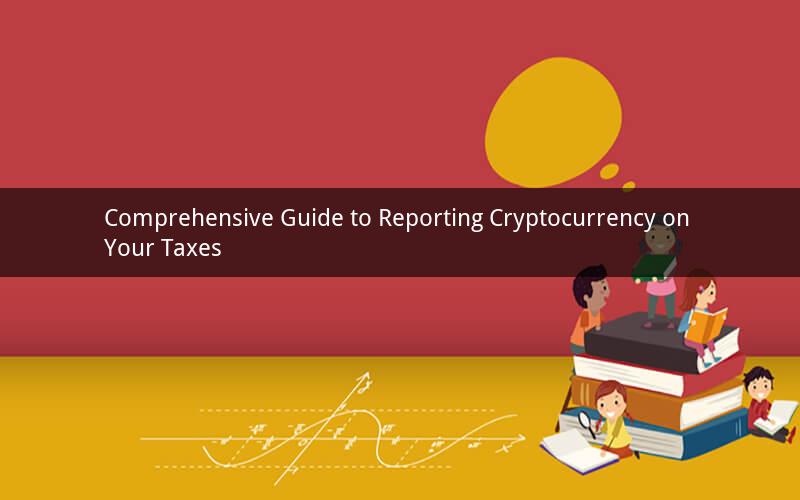
Introduction:
Cryptocurrency has gained significant popularity in recent years, and as a result, many individuals are now investing in digital currencies. One common question that arises is whether you have to report cryptocurrency on your taxes. This article delves into the intricacies of reporting cryptocurrency on your taxes, providing a comprehensive guide for individuals to understand their tax obligations.
1. Understanding Cryptocurrency Taxes:
Cryptocurrency, also known as digital currency, is a digital or virtual form of currency that uses cryptography for security. It operates independently of a central bank and is usually managed through a decentralized system called a blockchain. When it comes to taxes, cryptocurrency is treated as property, and individuals are required to report their cryptocurrency transactions on their tax returns.
2. Reporting Cryptocurrency Gains or Losses:
If you sell, exchange, or use your cryptocurrency for goods or services, you may be subject to capital gains or losses. The tax treatment of these gains or losses depends on several factors, such as the length of time you held the cryptocurrency and whether you sold it at a profit or a loss.
a. Short-term vs. Long-term Gains:
The tax treatment of cryptocurrency gains or losses is similar to that of stocks or other investment property. If you held the cryptocurrency for less than a year, any gains or losses are considered short-term and are taxed at your ordinary income tax rate. Conversely, if you held the cryptocurrency for more than a year, the gains or losses are considered long-term and are taxed at the lower capital gains tax rate.
b. Calculating Capital Gains or Losses:
To determine your capital gains or losses, subtract the adjusted basis (the cost of the cryptocurrency plus any additional expenses) from the sale price. If the result is positive, it represents a gain; if it's negative, it represents a loss.
3. Reporting Cryptocurrency on Your Tax Return:
To report cryptocurrency transactions, you need to complete Schedule D (Capital Gains and Losses) and Form 8949 (Sales and Other Dispositions of Capital Assets). Here's how you can do it:
a. Completing Form 8949:
Form 8949 requires you to provide detailed information about each cryptocurrency transaction, including the date of the transaction, the type of asset, the sale price, the cost basis, and the adjusted basis. This form helps you calculate your capital gains or losses.
b. Completing Schedule D:
Schedule D combines the information from Form 8949 and summarizes your capital gains or losses. You'll need to transfer the total gains or losses from Schedule D to your Form 1040.
4. Reporting Cryptocurrency Mining Incomes:
If you mine cryptocurrency, you must report the income generated from mining on your tax return. The income from mining is considered self-employment income and is subject to self-employment tax, which includes Social Security and Medicare taxes. Here's how to report cryptocurrency mining income:
a. Reporting Mining Income:
To report mining income, you'll need to complete Schedule C (Form 1040) or Schedule F (Form 1040) depending on whether you are a sole proprietor or a farmer. You'll include the total income generated from mining in the appropriate section of the form and pay the corresponding taxes.
b. Deductions for Mining Expenses:
If you incurred expenses related to cryptocurrency mining, such as electricity costs or hardware purchases, you may be eligible for deductions. These deductions are reported on Schedule C (Form 1040) or Schedule F (Form 1040) and can help reduce your taxable income.
5. Reporting Cryptocurrency Transactions with Exchanges:
If you conducted cryptocurrency transactions through a cryptocurrency exchange, you may receive a Form 1099-B from the exchange. This form provides details of your cryptocurrency transactions, including the sale price, cost basis, and any proceeds. Here's how to handle Form 1099-B:
a. Reconciling Form 1099-B with Your Records:
Ensure that the information on Form 1099-B matches your records. If there are discrepancies, you may need to contact the exchange or adjust your tax return accordingly.
b. Reporting Form 1099-B:
Transfer the information from Form 1099-B to Form 8949 and Schedule D to complete your tax return accurately.
Frequently Asked Questions:
Q1: Do I have to report cryptocurrency if I didn't sell any?
A1: Yes, if you received cryptocurrency as a gift, inheritance, or through mining, you still need to report it on your tax return. The value of the cryptocurrency at the time you received it is considered your cost basis.
Q2: Can I deduct the cost of cryptocurrency hardware or software on my taxes?
A2: Yes, if you incurred expenses related to cryptocurrency mining, such as purchasing mining hardware or software, you may be eligible for deductions. These deductions are reported on Schedule C (Form 1040) or Schedule F (Form 1040) and can help reduce your taxable income.
Q3: What if I received cryptocurrency as a reward for completing a survey or participating in a contest?
A3: If you received cryptocurrency as a reward or incentive, it is considered taxable income and must be reported on your tax return. The fair market value of the cryptocurrency at the time of receipt is considered the income.
Q4: Can I defer reporting cryptocurrency gains or losses by holding the cryptocurrency for a longer period?
A4: Yes, by holding cryptocurrency for more than a year, you can defer reporting gains or losses and potentially pay lower capital gains tax rates. However, you must still report the cryptocurrency transactions on your tax return.
Q5: Should I consult a tax professional for reporting cryptocurrency on my taxes?
A5: While it's not mandatory, consulting a tax professional can be beneficial, especially if you have complex cryptocurrency transactions or significant investment in digital currencies. They can provide guidance and ensure accurate reporting of your cryptocurrency taxes.